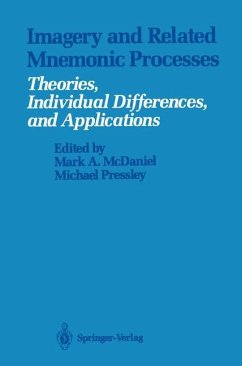
Mnemonic techniques, learning and intellectual disability
A trialogue that can be memorable
Versandkostenfrei!
Versandfertig in 6-10 Tagen
49,99 €
inkl. MwSt.

PAYBACK Punkte
25 °P sammeln!
This book presents a discussion on the use of memorization techniques (or mnemonic techniques) in the learning of people with intellectual disabilities, but proposing a different view of memory and memorization, one that has only been conceived as a villain in education, attacking and belittling this psychic function, but it is hoped that this reading will make it possible to rescue the forgotten value of the function of memory in every learning process and, therefore, in psycho-intellective and socio-affective development, not only but above all with people with intellectual disabilities. In ...
This book presents a discussion on the use of memorization techniques (or mnemonic techniques) in the learning of people with intellectual disabilities, but proposing a different view of memory and memorization, one that has only been conceived as a villain in education, attacking and belittling this psychic function, but it is hoped that this reading will make it possible to rescue the forgotten value of the function of memory in every learning process and, therefore, in psycho-intellective and socio-affective development, not only but above all with people with intellectual disabilities. In contrast to the mechanical view of memory as an inferior function, this paper constructs a more complex, multi-layered, interdependent, dialectical and interactionist view of memory as a superior psychological function. To this end, a historical review is made of the art of memory from ancient times to the present day, showing how this art has been persecuted and distorted, and anchoring theanalysis in the Theory of Subjectivity; and presenting really fruitful and promising results of a practical intervention with 3 young people with intellectual disabilities. For those interested in the field, we hope that this reading will be useful.












